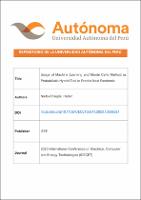| dc.contributor.author | Nieto-Chaupis, Huber | |
| dc.date.accessioned | 2024-04-05T14:55:59Z | |
| dc.date.available | 2024-04-05T14:55:59Z | |
| dc.date.issued | 2023 | |
| dc.identifier.uri | https://hdl.handle.net/20.500.13067/3092 | |
| dc.description.abstract | This paper explores the scenarios where the combination of algorithms based at Machine Learning with Monte Carlo method can be advantageous to assess the next pandemic. Thus, taking into account the experience of Covid-19, and the design of strategies that have served to alleviate the crisis cause by the spreading of Corona virus, in this paper a general algorithm is proposed. Essentially the proposal takes into account the gathered statistics along the years 2020-2021-2022 so that it constitutes a pattern that might be perceived again in next pandemics. In concrete, this work aims to present simulations taking as input the data of Covid-19. Special attention is paid on the initial period. It is because it was observed similar patterns in most countries that have reported a fast propagation of virus. Thus the MItchell's criteria are employed to identify the beginning of pandemic as well as the Monte Carlo method is also used in order to accept potential realistic events of pandemic, whereas the ones that turned out to be inconsistent to Covid-19 data and patterns of propagation are rejected. From the results, a discussion about the validity of this study is finally given. | es_PE |
| dc.format | application/pdf | es_PE |
| dc.language.iso | eng | es_PE |
| dc.publisher | IEEE | es_PE |
| dc.rights | info:eu-repo/semantics/restrictedAccess | es_PE |
| dc.rights.uri | https://creativecommons.org/licenses/by-nc-nd/4.0/ | es_PE |
| dc.subject | Cognitive machine learning | es_PE |
| dc.subject | Covid-19 | es_PE |
| dc.title | Usage of Machine Learning and Monte Carlo Method as Probabilistic Hybrid Tool to Predict Next Pandemic | es_PE |
| dc.type | info:eu-repo/semantics/article | es_PE |
| dc.identifier.journal | 2023 International Conference on Electrical, Computer and Energy Technologies (ICECET) | es_PE |
| dc.identifier.doi | https://doi.org/10.1109/ICECET58911.2023.10389521 | es_PE |
| dc.subject.ocde | https://purl.org/pe-repo/ocde/ford#2.02.04 | es_PE |


